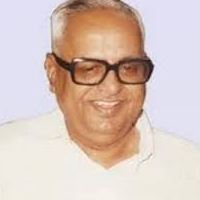Jalagam Vengala Rao
Jalagam Vengal Rao or Jalagam Vengala Rao was for much of his life a member of the Indian National Congress and was the Chief Minister of the Indian state of Andhra Pradesh .
Jalagam Vengala Rao was for much of his life a member of the Indian National Congress and was the Chief Minister of Andhra Pradesh.
Rao hailed from Bayyannagudem. His involvement in politics began when he was in his twenties, when he supported Congress in their campaign of armed defiance against the Nizam of Hyderabad. He was jailed for his involvement in this campaign, which was protesting the tenancy laws operating in the Telangana region. Although he tried and failed to be elected as an independent candidate in 1952, Rao subsequently was elected on four occasions to the Legislative Assembly of Andhra Pradesh, where he represented the Sathupalli constituency of Khammam district.
He was also twice elected to the Lok Sabha – the lower house of the Parliament of India – as a representative of the Khammam district constituency. The first of his successful Assembly elections was in 1962, and the period from 1952 to that time saw him occupying the post of president for the Khammam district branch of Congress and being the first chairman of the district council.
In 1968, he became State Home Minister in the state government headed by Kasu Brahmananda Reddy. Later, during his period as Chief Minister of Andhra Pradesh, an office to which he was appointed by Indira Gandhi[4] and held between 10 December 1973 and 6 March 1978, Rao’s hallmark was his administrative efficiency. He is also known for his handling and containment of Naxalite insurgency, which took place during a revival of the Telangana movement that sought independent statehood. He almost wiped out Naxalism from the state through extra judicial killings namely encounters. Later, the Vimadalal commission was appointed to probe into attacks on Naxalites during his period in office and his earlier actions against Communist-inspired Naxalites during the 1960s have been referred to as a “reign of terror”. The official website for the government of Andhra Pradesh refers to his tenure, which came about following a period of President’s rule, politically stable. Despite that popularity, he was unable to retain power in the 1978 elections.
When Congress split during the mid-1970s, Rao initially did not join with the faction led by Indira Gandhi that was referred to as Congress (I). However, he did join in 1984 and with his election to the Lok Sabha in that year he served in the cabinet of Rajiv Gandhi, holding the post of Union Minister for Industry until 1989. For much of this period, between 1984 and 1988, he was also president of the state organization of his political party, being the Andhra Pradesh Congress Committee.
He was the 5th Chief Minister of Andhra Pradesh from 10 December 1973 – 6 March 1978. It was during his tenure as Chief Minister that three universities namely Kakatiya University, Acharya Nagarjuna University and Sri Krishnadevaraya University were started, catering for three regions of Andhra Pradesh: Telangana, Coastal Andhra, and Rayalaseema. Rao initiated a World Telugu Conference in Hyderabad in 1975.
For the first decade after the State formation the political leadership was not very
enthusiastic towards industrialisation. Jalagam Vengal Rao’s tenure as CM (1973-78) is considered to be an important
landmark in the history of SBRs in AP. While taking forward the initiatives during
Brahmananda Reddy tenure, he displayed the recognition of the importance of
leadership and decision making styles in forging good SBRs. The major obstacle for it
was the notorious red-tapism in the functioning of governmental organisations. To
overcome this, he identified and entrusted the task to trusted and dynamic
bureaucrats who are seen as committed to this objective. One step forward in this
direction was to give freedom to them from any form of interference. Initiatives like
the Backward Areas Development Programme that aimed at the development of
backward areas by identifying their industrial potential and providing them with
appropriate incentives and linkages. Vengal Rao was also instrumental in
strengthening institutions like APSFC, APIIC and APSSIC. During his tenure, AP could
attract sufficient new investments during 1970s due to the proactive decisions taken
by the State government. The subsequent CMs, especially during 1978- 1983, were
not known for any significant contribution to the SBRs in the State. It was a period
in the history of the State, that despite a clear electoral mandate, the Congress party
could not ensure a stable government.

Jalagam Vengala Rao
Date of Birth: 04 May 1921
Birth Place: Khammam
Proffession: Former Chief Minister of the Andhra Pradesh
Nationality: Indian
Death: 12 June 1999, Hyderabad


